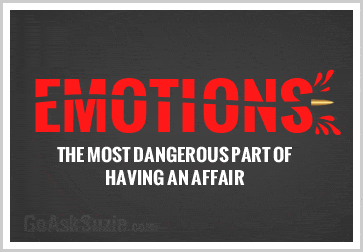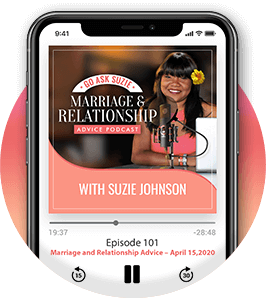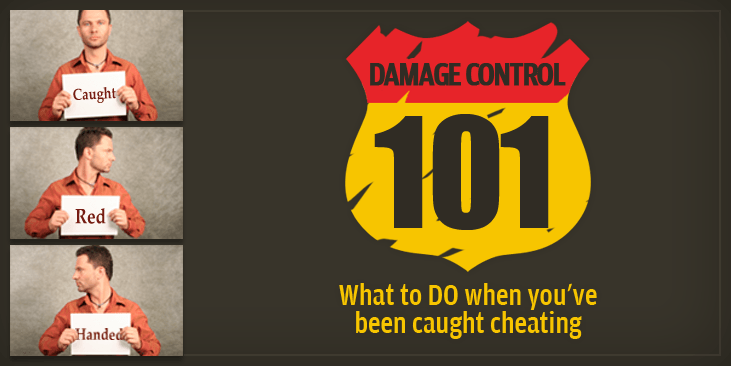![]() Dear Suzie, My wife just found out about my affair. She’s told me never to come back to the house and that she doesn’t want to ever see me again. I’m scared out of my mind. I don’t want to lose my family, but I’m not sure what my next move should be. What should I be doing now?
Dear Suzie, My wife just found out about my affair. She’s told me never to come back to the house and that she doesn’t want to ever see me again. I’m scared out of my mind. I don’t want to lose my family, but I’m not sure what my next move should be. What should I be doing now?
![]() I’m sorry to hear about your situation; however, you’re not alone. By the end of the day, thousands of extramarital indiscretions will be exposed around the world. Only a few wayward partners will confess. The majority will be caught red-handed. Unfortunately, when people get caught cheating, they usually panic. As you can imagine, panic is not necessarily conducive to handling a crisis correctly. Here’s something else you should know: Once you’ve been caught cheating, there are basically only two options open to you.
I’m sorry to hear about your situation; however, you’re not alone. By the end of the day, thousands of extramarital indiscretions will be exposed around the world. Only a few wayward partners will confess. The majority will be caught red-handed. Unfortunately, when people get caught cheating, they usually panic. As you can imagine, panic is not necessarily conducive to handling a crisis correctly. Here’s something else you should know: Once you’ve been caught cheating, there are basically only two options open to you.
Your Two Options
 You can continue using the same strategies that got you in trouble with your marriage and hope they will get you out of trouble.
You can continue using the same strategies that got you in trouble with your marriage and hope they will get you out of trouble.
If you take this option, keep in mind that continuing to do what got you into trouble in the first place is exactly the type of thinking that leads you deeper into trouble.
Gambling addictions are a great example.
According to research, one of the biggest reasons why gamblers get into trouble is because the addict has a mysterious predisposition to continuing to gamble when losing. For example, say the gambling addict is down $1,000 playing slots. Now, rather than cutting his losses and walking away… the addict does something remarkably stupid. He keeps gambling. He thinks since he’s already lost $1000… the odds say he’s now even more likely to win $2000. Obviously, the odds of winning are NOT in his favor, and anyone who doesn’t have a gambling problem can clearly see how illogical this approach really is. But alas, the addict’s mind never makes the connection and will continue thinking this way until disaster is complete.
Today, you face a similar option.
When you get caught cheating, you can continue to use the same strategies that got you in trouble; in fact, many wayward partners do. Rather than limiting their losses, they continue to lie, manipulate, deny, and deflect — hoping the same dark art strategies that led them to cheating in the first place will get them out of trouble after they’re caught. Not only is this type of thinking illogical, it’s actually very dangerous (more on why later).
Here’s your second option:

You can use a completely different approach.
Once you make the intelligent observation that the thinking that led you into trouble in the first place could NOT possibly be the thinking that will lead you out of trouble, then you’ll begin to look for another approach. But just in case you haven’t made that connection yet, here’s something else to consider:
What do you know about your situation for sure?
Well, you know that your past thinking and behavior led you into trouble (fact). And if this type of thinking led you into trouble, then you must ask yourself: can this thinking be depended upon to lead me out of trouble? The common sense answer is no. It’s so obvious to most that if the old thinking got you into trouble, then it will take some new thinking, new approaches, and new strategies to get you out of trouble.
Which option will you take?
That’s totally your call.
If you decide to go with Option #1 — continuing to use the same strategies that got you into trouble in the first place — then this website and all its contents will not prove very useful to you.

However, if you’re open to Option #2 — trying new strategies and approaches to handling the trouble you’re in — then you’ve come to the exact right place.
FAIR WARNING: What follows is my crash course on how to best manage the negative effects brought on by your mistakes. You and I are going to cover few of the most basic (and yet crucial) what-to-do’s and what-not-to-do’s for anyone who has wandered across the line between fidelity and infidelity… and got caught.
Keep in mind as you read:
I offer no judgments… just effective strategies and insights.
While I do believe depending on cheating, lying, and manipulating others — in order to get your own needs met — are immature tactics. I also don’t believe such tactics call for punishment. I believe instead that they call for correction. With that said, let’s get right to it.

What Is Damage Control?
I borrowed the term from corporate America. What it speaks to is a collection of strategies that companies use to limit the impact of a mistake, crisis or disaster.
What YOU should know about damage control:
Damage control consists of two parts.
- Part A: What to do
- Part B: What not to do
Both are extremely important. Here’s why. In the aftermath of infidelity, what you don’t do can have as much impact as what you do (sometimes even more).
In this article, I’m going to give you a crash course on Part B: What NOT to do. I call this the Seven Deadly Mistakes. The reason they’re so deadly, in my opinion, is because so many of them are knee-jerk, instinctive reactions. Chances are you’re doing some of them right now (without even realizing it).
Click to the next page and let’s go over each one…
7 Mistakes To Avoid After You’ve Been Caught Cheating

THE RECIPE FOR EMOTIONAL AFFAIRS

Defensiveness: Defending Your Excuses or Playing the Victim Card
Nobody enjoys having their mistakes splashed across the front page news.
No one likes admitting when they’re wrong, and most people (myself included) absolutely never, under any circumstances, want to look weak.
And yet, when you make a poor “judgment call” and get caught, those are precisely the consequences you can expect. So in an effort to overcome discomfort, the knee-jerk reaction for most people is to make excuses or rationalize their behavior.
You know you’re defending the excuses for the affair when:
You try to blame your behavior on things like stress, fatigue, alcohol, emotional overwhelm, a bad childhood, lack of sex in the primary relationship, and other equivalent dodges.
You know you’re playing the victim card when:
You use words like, “I didn’t mean to,” “I was seduced/tricked/manipulated,” “I couldn’t help it,” or “it just happened.”
Why this doesn’t work:
When a person defends a poor judgment or twists facts by pretending to be the victim instead of the perpetrator, it sends a clear message of, “I don’t believe I’ve done anything wrong” OR “I just can’t keep myself from making mistakes.”
Would you imagine that these kinds of statements are going to inspire confidence, sympathy, or respect? Of course they won’t. In fact, the denial of wrongdoing and rejection of responsibility actually has the opposite effect. It triggers mistrust, contempt, and suspicion. And when you think about it, as long as you believe your excuses for the affair justify it, why would you ever want to change? (something to think about)
People are smart enough to figure out that as long as you’re defending your excuses for having an affair or blaming circumstances for your indiscretions, then you really aren’t interested in correcting or learning from those mistakes. Think about it. Common sense tells us that what you defend, you want to keep.
Here’s the bottom line:
There are no good reasons for infidelity, but there are plenty of excuses. So as long as you’re defending those kinds of excuses or portraying yourself as the victim of your own emotions and circumstances, then you won’t be doing yourself (or anyone else) any favors.


Failure to Show Appropriate Types of Emotions
Unfaithful partners who fail to show appropriate emotions during the crisis make things worse. This mistake has a tendency to coattail on the previous one. And it’s a big one. Like failing to respond to a fire with water, failing to show the appropriate type of emotions keeps the crisis burning longer.
You know you’re failing to show appropriate emotions when:
- You don’t want to talk about it anymore.
- You don’t know what the fuss is all about.
- Secretly, you think your partner got what was coming to them.
- You feel numb, or you just don’t care.
Why this doesn’t work:
For the people around you who may just be waking up to the reality of your secret life, your emotional disconnection is like pouring salt into their open wounds. No matter how bad things are already, your emotional disconnection is sure to make them a lot worse. What your partner wants (and needs) from you right now isn’t coldness, numbness, self-pity or self-righteousness.
What your partner is looking for are:
- Signs of your humanity (vulnerability, humbleness)
- Signs of remorse (BTW: remorse and guilt aren’t the same thing)
- Signs that you recognize how much your actions could and did cause hurt and pain
- Evidence of unselfishness
- Signs that you’re willing to stand up and take responsibility for what has happened
And perhaps the biggest emotional sign of all: signs that you still care.
If you’re finding it difficult to express or connect with these types of emotions, chances are, you might be defending the affair (even to yourself). This indicates that you’re still not ready to deal with the truth of what really happened. In that case, it’s time for you to own up to this reality. (Which brings us to the next mistake.)

Avoiding Accountability and Responsibility for Your Mistakes
Mistakes have been given a bad rap throughout the ages.
When you think back on it, as kids, most of us were punished when we made mistakes. It’s no wonder we try so hard to avoid being accountable or accepting responsibility when we do make mistakes.
It’s not the mistake we are afraid of… it’s the punishment.
You know you’re trying to avoid responsibility or accountability for your mistakes when:
- Your sentences begin with “they”, “them”, and “because”.
- Your language includes a lot of excuse-making conjunctions like “if only”, “I would have, but”, and “it’s not my fault because”.
- You find yourself preferring to lie to avoid (or deny) rather than face the negative consequences of your mistakes.
Why this doesn’t work:
After the affair is discovered, it’s illogical to deny making a mistake. No one lives a mistake-free life. Your partner understands this. (Deep down, we all do.) Therefore, he or she knows your arguments and excuses, and evading the consequences of those mistakes are quiet acts of defiance.

Think about it from your partner’s point of view.
What does the attempt to avoid responsibility for your mistakes say about you? Well, for one thing, it suggests that you might not have the chutzpah to stand up to your mistakes and correct them.
And another thing…
There’s no attractive way to wiggle out of taking responsibility. There’s just no dignified way to do it. In fact, trying to get out of it often takes as much energy as facing it. In the end, it will always cost you more to deny responsibility, than to just stand in the storm and own up to it.
Here’s something else
If you find that it’s just too scary to allow yourself to be accountable for your mistakes, ask yourself the following question.
Key Question: Do you look forward to repeating the same mistakes over and over… again and again?
If you answered no, then I suggest you use a different approach. Rather than assume that mistakes are a call for punishment, assume they’re a call for correction. What’s the first step to correcting any mistake? You guessed it: admitting you’ve made one!

Failure to Exit the Affair Permanently
If there’s one thing wayward partners hardly ever factor in when they’re considering an affair, it’s this:
Emotions!
This is a tragic case of shortsightedness.
At the beginning of the affair, most assume they can handle it, so they overestimate their ability to control their emotions (and the emotions of the affair partner). This causes them to seriously underestimate just how powerful human emotions really are.
Here’s the missing key
Emotions are primitive (especially sexual emotions). They have a potent impact on the human psyche and nervous system. To underestimate them is always a mistake.
The power of emotions should never be underestimated.

Emotions are like an unconscious autopilot guiding our behaviors. They influence our decisions and often cloud our judgment. I have heard countless affair partners (who ended up falling in love with a married person) confess to me that they never meant for it to happen, and yet it did. And I have seen many wayward partners shake their heads in total astonishment… after the fact… because “it all started out innocently” or “one thing led to another,” and they aren’t sure how they ended up where they did.
So what’s going on here?
I believe 95% of what we’re dealing with is those ever-present, pesky, persistent things we call emotions. (Even scientists can’t fully explain them to us).
What we do know is this: emotions are the pathway by which most of us can be manipulated. It’s also the route people use to manipulate others. This is why I caution people about being overconfident when dealing with temptation. Once triggered, our sexual emotions are like bullets being sprayed from a machine gun. They take on a life of their own. To assume you’ll be able to control them is not only naive, but it’s also dangerous. Sadly, many people only discover this after the fact. This is why many wayward partners find themselves seduced, hooked, and addicted to the emotional highs of the affair. So potent are these emotions that even once the affair is exposed… many wayward partners find themselves unable (unwilling) to let go completely. They will lie to marriage counselors, lie to their spouses, and even lie to themselves… rather than end the affair.
Why failing to exit the affair never works:
You can’t save your marriage AND keep your affair.
One of them has to go!
Believe me, I’ve seen many wayward partners try, but the facts remain: failure to exit the affair permanently sends an ambiguous message. It doesn’t take much common sense for any of us to realize that when someone’s goals are divided, chances are pretty good that person just can’t be trusted.
Think about it this way…
Even if you don’t want to choose, you still have to choose. The decision to become a better liar is still a choice. The decision not to decide (aka: indecision) is STILL a choice. The question is never IF you will choose… the question is always what you will choose. In that, you have no choice.
Ask yourself…
“Which relationship do I truly want to save?”
I’m not saying you have to choose your marriage. I’m simply saying you have to choose ONE. You can’t save both.
And if you’re having a hard time letting go…
Maybe the challenge is that you don’t want to lose the feelings the affair has given you. If that’s the case, then ask yourself… is it possible to achieve these same feelings in your primary relationship? I believe you can. And this is why I created my Passionate Monogamy process. The key insight is that you can’t save both relationships — you must choose one.
That brings us to the 3rd biggest mistake you must avoid when you’ve been caught cheating.
The Final 3 Mistakes To Avoid
THE RECIPE FOR EMOTIONAL AFFAIRS

Supplicating, Begging, or Bargaining
This is a biggie!
People don’t usually realize just how supplicating, begging, bargaining, beseeching, and pleading are perceived. When children use these tactics, we think they’re cute and they work, but when adults use them, they have a tendency to backfire.
Rather than being endearing, they’re actually repulsive to most people. Rather than triggering sympathy or compassion in others, it usually triggers the opposite of all that and comes off as manipulative, insincere, and unattractive.
You can recognize supplication whenever:
- You make promises over and over about how you’re going to change.
- You do things that normally even you would find repulsive.
- You debase yourself, your dignity, or your self-respect.
- You try to buy your way into forgiveness with trips, gifts, and trinkets.
- You repeat any of the previous (or similar) patterns over and over again.
Why this doesn’t work:
Most of us have a built-in radar for spotting insincerity. We can sense it a mile away. No matter how hard you might try, and no matter how emotional your promises to change might appear, they wind up coming off as empty words meant to appease in the heat of the moment, and your partner senses this (even when you don’t).
Here are some clues to insincerity:
- You make it a hard sell.
- You do a lot of bargaining.
- You start offering things that earlier, you were dead set against.
- Your deals seem too good to be true.
What if you really do mean to change? What if you truly do want to make amends?
Then your actions will speak louder than your words, and you won’t need to supplicate, beg, or bargain… will you? You see, sincerity (like love) requires no persuasion techniques. It’s its own proof! And just like being in love, nobody needs to be told that you’re sincere — you just are.

Unwillingness to Endure Discomfort
I heard a famous psychologist remark once that in his opinion, the drug and alcohol abuse problems we face in America come as a direct result of our collective unwillingness to endure discomfort. When you think about it, there are certainly enough signs that he might actually be right.
For example, teenagers often say one of the reasons they turned to drugs was to alleviate the discomfort of boredom. Many recovered adult alcoholics confess that turning to alcohol was an attempt to alleviate the discomfort brought on by things like daily stress, pressures from work, or problems at home.
Very few things unleash discomfort like the exposure of a secret life.
That’s right. The instant a secret life is exposed and all the hidden lies and deceptions come to light, life immediately takes on an extremely uncomfortable air. In fact, many wayward partners have described the moment of discovery as one of the most painful and uncomfortable encounters they’d ever experienced.
You can recognize that you may be having difficulty enduring discomfort whenever:
- You invent more clever lies to cover up other lies.
- You try to run away (physically and emotionally) from dealing with it.
- You don’t want to go to counseling because of what you might discover about yourself (or what others might discover about you).
- You avoid talking about it, thinking about it, or dealing with it.
- You drink and/or use drugs to help you cope.
Why this doesn’t work:
Here’s the way I see it.
Rather than alleviating the discomfort unleashed by the discovery of an affair, what these tactics do is take you from the fire… right into the frying pan. Because, just like you can’t borrow your way out of debt, you can’t lie your way back to trust, and you can’t heal a broken relationship by continuing to wound it.
Here’s another thing:
Being unwilling to endure discomfort (especially discomfort that you played a part in creating) sends an unmistakable message to your partner that you’re somebody who lacks the key qualities that inspire trust — qualities like courage, strength, and the ability to tolerate discomfort.

Here’s something else to consider:
According to the U.S. Marine Corps, the ability to tolerate discomfort is one of the key characteristics of a good Marine. For example, “Yankee White” is the highest-level designation attainable by any military personnel. Only Marines with this designation are cleared to fly the president aboard Marine One. To begin with, only the crème de la crème of the Marine Corps are ever invited to serve on the HMX-1 crew. Of those invited, less than 4% make it all the way through training.
So what’s going on here?
It’s their ability to endure. You see, the four-percenters are those Marines who have successfully demonstrated their ability to tolerate adversity, and have endured untold hours of tediousness and discomfort. They have shown (without question) that they have the emotional and mental resources needed to handle whatever conditions they find themselves in. Now I don’t know about you, but for me, that kind of depth would inspire my trust.
It works the same way in relationships.
After you’ve been caught cheating, if you want to repair the primary relationship (and I’m assuming you do, or you wouldn’t be reading this), then you must demonstrate your ability (and willingness) to stand in the storm that you’ve created and endure the discomfort brought on by your mistakes.
Why is standing in the storm so important? Because not only does it demonstrate the things that inspire trust — strength, courage, accountability, willingness to learn, persistence — it also inspires respect.)
The word respect is important here.
Because the one thing you lose when a double life is exposed is respect… and once you’ve lost respect, you haven’t just lost the battle, you’ve lost the war.
So if you want to repair your relationship, you need to move heaven and earth to regain respect. In order to inspire trust and respect, you’ve got to resist the urge to run, hide, or evade the discomfort brought on by your mistakes. Instead, learn how to lean into the discomfort and stand in the storm.

Failure to Remove the Excuses
Do you know what got you in trouble in the first place? The basic setup goes something like this (see if it sounds familiar). At some point, you had a strong desire and a strong curiosity to experience something different, and the affair appeared to offer you a way of getting those desires satisfied with little or no risk of getting caught.
Somehow, you managed to glamorize the opportunity… and you went for it. Before you knew it, you were caught like a fish who took the bait.
For most people, an extramarital affair begins as simple and as complicated as that.
Now, reexamining the previous scenario (even if this isn’t exactly the way it happened for you), where do you think the trouble really started? Here’s my theory (go along with me on this):
The trouble wasn’t the desire you had, and it wasn’t that you wanted to experience newness, novelty, excitement, and romance. We all want these things. It’s natural and it’s normal. So if desire is not what leads us into temptation, then what is it?
Let’s take another look at the typical progression of an extramarital affair.
A strong desire + excuse/rationalization + willingness to use black-hat strategies + perfect opportunity = Extramarital Affair
Here’s the bottom line:
The character differences between a person who remains faithful from one who strays comes down to two things:
- Willingness to rationalize (excuses that make wrong actions appear right)
- Willingness to use black-hat (deceptive) strategies to cover your tracks
Think back with me and ask yourself…
When did your indiscretion shift from being just a possibility, to becoming a real opportunity? As you trace it back in your timeline, most likely you’ll discover that it shifted the moment you were able to rationalize moving forward with it.
Second question:
When did cheating on your spouse shift from NOT being okay to being okay? I believe it shifted the moment you gave yourself permission to use deception to cover your tracks.
Now, here’s the challenge.
Once the affair has been exposed, partners often rely on the power of the same techniques that got them INTO trouble to get them OUT of trouble.
In other words…
They defend their excuses for having the affair (rather than removing them), and they continue to use more black-hat (deceptive) strategies (rather than discarding them).
Why this doesn’t work:
Your partner knows you didn’t have a perfect marriage. Why? Because marriages are made up of people, and there aren’t any perfect people. This means that anyone looking for an excuse to cheat can always find one. And as long as you defend your excuses to cheat, you leave the door open to cheating again.

What is an excuse?
An excuse is any argument that allows a wrong action to appear right.
Here’s the thing about human nature: we will not take any action unless we believe that action is right. This means that when we do something wrong, we must find a way to justify it in our minds (make it right) before we can do it.
This is the role excuses and rationalization (rational-lies) play in affairs. They help wayward partners make it okay in their minds to take wrong actions. However, until you confront the excuses that made it okay for YOU to have an affair, you haven’t yet learned from your mistakes. Your partner knows this. And as the saying goes… “Those who don’t learn from their mistakes are doomed to repeat them.”
Which brings us full circle.
Remember we began our conversation with the notion that continuing to do the same things that got you in trouble will not get you out of trouble? This principle definitely applies to your excuses for the affair. If you continue to defend your “why” for having an affair (remember there are no reasons, only excuses), then you’ll simply keep digging yourself into a deeper hole.
Here’s my suggestion.
Discard the excuses. Don’t cherish them. Don’t cling to them. Remember, those excuses are the same ones that caused you to abandon your integrity. They caused you to lose your partner’s respect. They caused you to take wrong actions, and that alone should tell you they aren’t doing you any favors.
There you have it… the Seven Deadly Mistakes to avoid when you’ve been caught cheating.
I believe this is a good starting point for you and a great way to begin basic damage control. Obviously, knowing what NOT to do isn’t enough. You must also know what TO do next at a time like this.
Until we speak again…
Remember… Love Wins!

Don’t forget… You can now get over 13.5 hours of my best Wayward Partner strategies. Learn More Here
































